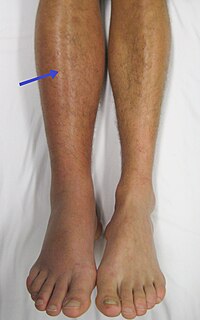
Photo from wikipedia
Abnormal coagulation tests are frequently observed in critically ill patients even in the absence of haemorrhagic symptoms. In patients with severe COVID-19 abnormal coagulation tests, including an isolated prolonged APTT… Click to show full abstract
Abnormal coagulation tests are frequently observed in critically ill patients even in the absence of haemorrhagic symptoms. In patients with severe COVID-19 abnormal coagulation tests, including an isolated prolonged APTT have been reported in patients with severe Covid-19. These include increased levels of D-Dimero, fibrinogen, FVIII and Factor von Willebrand, and increased prothrombin (PT) and activated partial thromboplastin (APTT) times. Infection with the SARS-CoV-2 virus can cause a hyper-coagulable state known as COVID-19 associated coagulopathy (CIC) and is associated with both venous and arterial thrombosis. As such prophylactic anticoagulation with heparin or lowmolecular weight heparin is recommended in all hospitalized patients who have no contraindications. However a prolonged APTT in these patients may result in inadequate or no antithrombotic therapy, the use inappropriate use of blood products such as fresh frozen plasma and delay in invasive procedures or surgery. A prolonged APTT may indicate the deficiency of a coagulation factor, the factors VIII, IX, XI, XII and von Willebrand disease or the presence of an inhibitor which may be specific e.g. anti-Factor VIII or non-specific such as the anti phospholipid syndrome. A prolonged APTT should prompt further investigation especially in patients without prior anticoagulation therapy or liver disease. The presence of an elevated haematocrit (>55%), incomplete filling of the sample tube, contamination with heparin or prolonged time between the sample collection and processing (> 4 hours) all may lead to a falsely prolonged APTT and should be excluded. If these causes are excluded a mixing study with normal plasma in a 1:1 and 1:4 ratio and the APTT performed immediately and after two hours incubation at 37 C. An impaired correction of the APTT in either ratio or assessment is consistent with the presence of an inhibitor while the correction in all is consistent with a deficiency of one or more coagulation factors. The specific tests for an inhibitor or factor deficiency should then be performed to determine the specific abnormality. We present the case of a 23 year-old man with moderately severe COVID-19 pneumonia and a prolonged APTT, the subsequent investigation andmanagement. * Corresponding author at: Faculty of Medicine, University Finis Terrae, Av. Pedro de Valdivia 1509, Providencia, Santiago, Chile. E-mail address: [email protected] (N.P. Murray). https://doi.org/10.1016/j.htct.2021.06.017 2531-1379/ 2021 Associação Brasileira de Hematologia, Hemoterapia e Terapia Celular. Published by Elsevier España, S.L.U. This is an open access article under the CC BY-NC-ND license (http://creativecommons.org/licenses/by-nc-nd/4.0/). hematol transfus cell ther. 2021;43(4):515−517
Journal Title: Hematology, Transfusion and Cell Therapy
Year Published: 2021
Link to full text (if available)
Share on Social Media: Sign Up to like & get
recommendations!